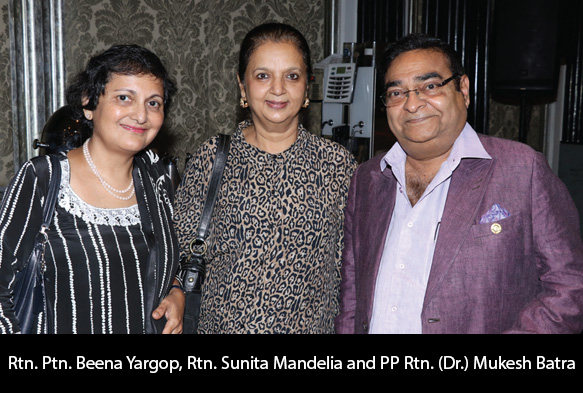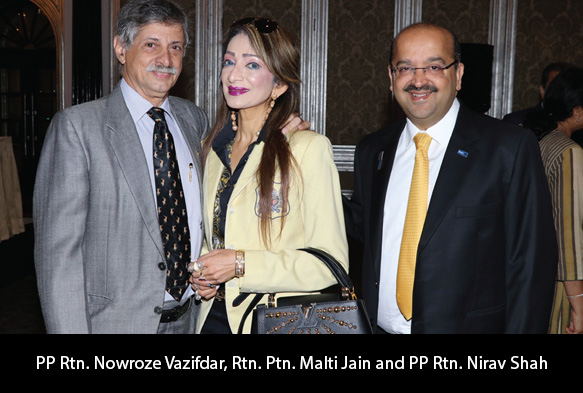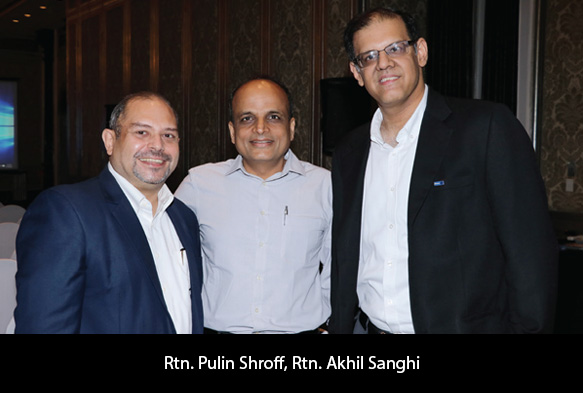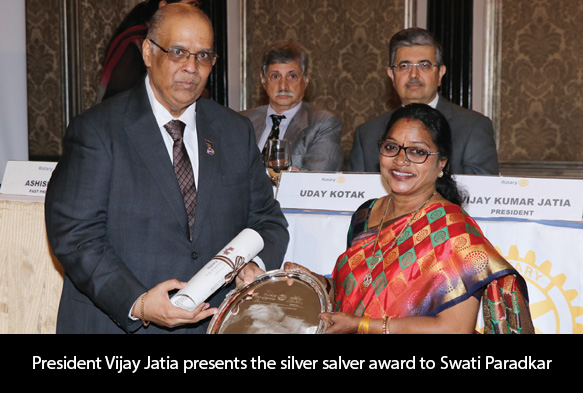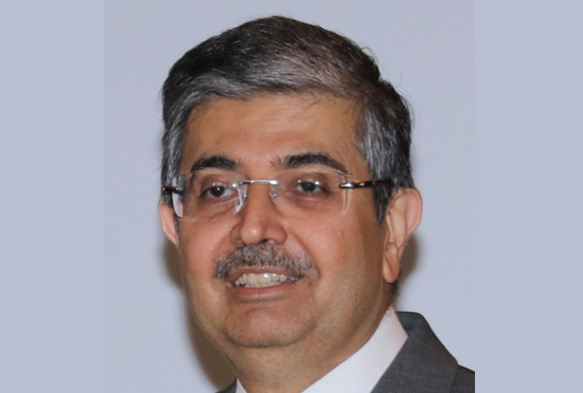
IS THE COUNTRY’S FUTURE BRIGHT?
Where will we stand in six years time? Last Tuesday’s speaker, Hon. Rtn. UDAY KOTAK, takes a closer look
The last meeting of Rotary year 2018-19 with President Rtn Vijay Kumar Jatia was one to remember as it not only marked the attendance of 218 Rotarians and guests but also welcomed the Club’s 12th Honorary Rotarian, Uday Kotak.
Later, Uday shared his thoughts with the Club on: ‘What India will look like in 2025’. The talk was a melting pot of all the aspects that constitute India — cricket, Indian music, food, education, Bollywood sports and, finally, its economy.
“This is cricket season, and we are in the middle of 2019 ICC World Cup. Most of us believe India will make it. My subject today is: What India will be in the year 2025. Between now and 2025, will come another World Cup, in 2024. So I start with this concept of cricket, a remnant of the British Empire.”
“A couple of weeks ago, I was at a dinner with the family of the US Consul General, Edgard Kagan. To my astonishment, his 12-year-old son, Daniel is passionate about cricket and as good as any expert on it. So, what I would like to think is, that, the 2024 World Cup should participation from big players like US and China and India should beat them all.”
My first dream of 2025 is of India as world champion in cricket with the best of countries playing alongside them.”
“The true measure of a country’s progress is not just hard power. While hard power is important for its sheer ability to dominate the world, to become truly world class it is important to have soft power. This brings to mind the phenomenal victory we had with the Modi Government coming back to power with a strong endorsement by the people of India. India has a lot of muscular ability in handling the hardware of its future. What is also crucial for the development of a world power is the development of software.”
“I would love to see India out there in the area of music. What are we doing to make Indian music recognisable across the world and heard everywhere? What are we doing with reference to food? Bloomberg has published a list of the top 10 restaurants in Mumbai. Of course, Sea Lounge is in this list but Swati Snacks is there too. Vijay was thoughtful enough to organise food from Swati Snacks today. Therefore, soft power is not just about GDP. It is about leadership in thought, and in the way human minds think. I would love to see India, between now and 2025, leading in music, food and education.”
“What are we doing to develop Indian education and make it world class? Why do so many of our kids want to go to the US to study or to Canada? What are we doing to not just keep them here but also import the global community into our schools and colleges? This is the change I would like to see in India between now and 2025.”
“Once, while talking to the Deputy Prime Minister of Singapore, I asked, as it was a small country, what made it unique? He said that it was because Singapore is a small country that they did not believe in averages. He said, ‘We believe in peaks in each area of focus. If we are average, why would anyone take Singapore seriously? He may as well go to a Jaipur or a Rajkot.’ So what are we doing to make our cities, towns and activities at the peak rather than being satisfied with averages?
“India deals with a large number of people who are even below the average, therefore while we work on getting these people towards the average, the true success of our country will be when we start capturing peaks and being outstanding in areas of excellence. This is related to our hardware as well. Take the case of China versus India: On hard facts, India is so much behind China and therefore, for us to take over China in addition to hard facts, we will need soft power.”
“India’s Bollywood is our software power. It is that cutting edge which is sidestepping the ability of the hard guys and moving forward to take leadership position and, in the bargain, creating new, innovative jobs in the future as well. The future of jobs is going to be in leisure, arts, sports and other areas which we traditionally do not connect with jobs.”
“My family is now into an interesting sport called kabaddi; it is a very Indian sport. Many players in rural India whose annual income used to be Rs 50 to 60,000 a year, now make closer to a crore a year because kabaddi as a sport has developed and it is encouraging people to get in to this sport across the length and breadth of the country. Therefore, the power of creating multiple avenues beyond traditional thinking of business is crucial for India to become a world class country in the coming years.”
“In that context, just to give some facts about China, India’s per capita GDP today is over $2,000 while China is at nearly $10,000 per individual. If India has to get to where China’s per individual income is, it has to grow close to 10 per cent for the next 20 years. It is an uphill battle and we need to find interesting ways to getting around this to have a truly developing country. In this context, I would like to specifically mention two important points our Prime Minister made recently, post-Elections, ‘Sab ka saath, sab ka vikaas’ and most importantly, ‘Sab ka vishwaas’. I think these are crucial for our future.”
“How do each of us build trust? There is significant trust deficit between the world of business and government. I also wear another hat, as president designate of the CII and one of the most significant objectives that we have laid down is how to bridge this gap.”
“The future is going to be about clean governance and clean business. I also embrace the phrase ‘Ease of Living’ beyond ease of doing business. The Prime Minister has said it and there is a merit to it. This in, many ways, tied with the business of hardware and software of how we build our country. Therefore, combining Saath, Vikaas, Vishwaas and Ease of living is where our future is. I would like to see this development between now and 2025.”
“It is here that I must compliment institutions like Rotary. My father shared with me the six areas of focus to make a difference to India. Whether we get ahead of China or not in GDP is a matter of debate but I would love to see an India which is a combination of high quality of power with ease of living, trust and progress. .”
“In that context, there is another interesting development in front of: a new wave of nationalism has become the fashion around the world. In this world of Vladimir Putin, Xi JinPing and Donald Trump, we have to rework and rewrite the rules of engagement. Particularly in the context of business and finance, we need to move to a significant domestic capacity building where we are able to sustain ourselves if a Trump tweets something and decides to ban imports or ban Nostro accounts to India. How self-resilient are we, to be able to withstand shocks of power? How ready is India to have that capability? This is not an easy battle. We are not in the big league of battles. The big league of battles is between China and the US at the front and maybe Russia after that. Irrespective of how we feel about our position in the world, we are significantly behind these three in the global power game.”
“We need to build our capacity in each segment of activities. I am not being protectionist; I welcome foreign apital. But that cannot be instead of us building our own capacity and capability. I would love to see India, in 2025, say that we have these areas of excellence, we have been able to change the lives of millions of Indians and we are proud about ourselves as a race which is transforming the world.”
ROTARIAN QUESTIONS
How do you think will the dispute between the US and China pan out? What is India’s role? Can we take advantage or not?
In many ways, China is ahead of the US. What China did was that right in front of the eyes of the US, it did not allow Google, Facebook or any of the others enter China. They built their own domestic companies, be it an Alibaba or others. They have become global powers and, at the same time, they have kept these big boys out.
Today, the US is now recognising that this trade war with China is also a war over control of future technology. Future technology is also going to control military power and this is a much bigger strategic battle between these two countries.
The US kept its markets open, allowed China to export by underpricing factors of production and accumulating huge reserves. This is going to be a huge global issue in the years to come and whatever one’s views maybe on Donald Trump, most American businesses agree with what he is doing vis-a-vis China.
For us, as India, we need to have a good relationship with the US as well as with Japan. But from the point of view of geography, our neighbour is China. So, our ability to manage this huge elephant next door is going to be a huge challenge because it has a much greater ambition to spread itself. Therefore, this battle between the US and China is god-sent for India because it, at least, gives us some manoeuvre in our relations with China.
What do you expect on July 5th (budget)?
The new government is wellintentioned but there is an important message shared by the Prime Minister that will flow through the budget. There are only two castes in India: one is the poor and the other is the one which does more and more for the poor. Therefore, the budget is going to be directionally consistent with this fundamental philosophy. As a citizen of India, while I have no issue with the philosophy, we need to ensure a better distribution of the cake. We should keep in mind that the growing of the cake is as important as its distribution. I also hope that the budget, while focusing on the distribution of the cake, gets the Indian entrepreneurial spirit back in a big way to invest more.
What are your views on the Hong Kong demonstrations by people?
In this era, where most powers of the world desire hard power, the people of Hong Kong have demonstrated that they care for their freedom.
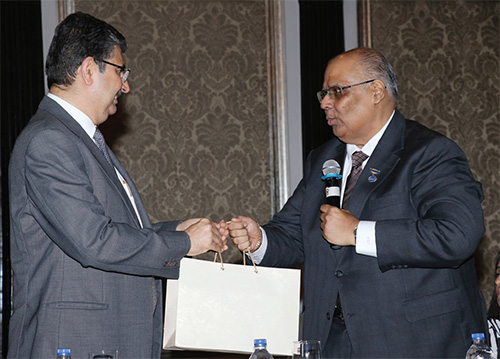
For the people of Hong Kong to step up and say this to the dictatorial Chinese authorities is a very welcome development.
Any view on the NBFCs and banking, structural changes?
I think we should divide it into two parts, one in which the NBFCs have issues of solvency and/or governance. The second issue is of liquidity. Right now, there is an attempt in some quarters to bring up the liquidity issue to what may be actually solvency or a deep governance issue.
How do you think education should be remodelled or revolutionised to cope with the position we are taking on?
I love engineers so we should ensure we have world-class engineers. We need to have education of liberal arts and India needs to create and encourage the culture of free thinking, the kind that the US has done. There are many universities who have made significant progress in this direction, in addition to engineering as well. But let us create an inclusive civil society.
If India is to become a $5 billion dollar economy, financing is the most important thing. What is your view that there is a little mistrust between PSU banks and people who want money (Indian entrepreneurs)?
We need to create new venture capital so that equity is available to entrepreneurs in addition to their own capital. On the issue of bank financing, some society change is required:
- We would love to see companies come to us with honest balance sheets.
- We should be able to trust audited signatures, however small or big the firm.
- The number should be real.
- The industry of valuers should act responsible; there is a huge valuation profession available.
So, we would like to give our money but sometimes we would like to get that money back too.

